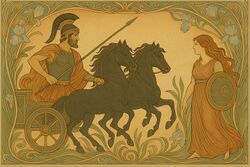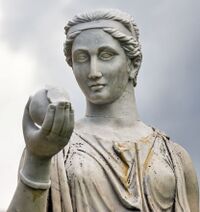Eris (mythology)
Eris (/ˈɪərɪs, ˈɛrɪs/; Greek: Ἔρις, though that looks like Epic to me; "Strife") is the Greek goddess of strife, discord, and unkempt bedrooms because the kids won't put their dirty clothes in the hamper. Homer equated Eris with the war-goddess Enya, whose Roman counterpart is Bellona. (Enya had one hit song in Elvish but nothing yet in Greek.) She had little popularity (Eris, not Enya), with no temples or prayers to her name, although some "sexed-up" renditions have caught on with the Internet crowd (see below).
Etymology[edit]
The derivation of Eris is unclear, though there are Greek words that sound a bit like it but don't mean anything similar. R.S.P. Beekes rejects these origins and suggests a "pre-Greek" origin, like when Greece emerged on the world stage, everyone was talking about her, so they just kept doing so. This is a fancy way of saying he hasn't a clue.
Family[edit]
Eris was the eldest daughter of Zeus and Hera.[1] Even as a child, she was bloodthirsty, pulling the wings off butterflies and decapitating her dollies. Her brother Ares liked Eris. (He too had a destructive personality.) Her other siblings, Hephaestus and Hebe, kept away from Eris after she tried to kill them.
History[edit]
Eris was famously disinvited from the wedding of Peleus and Thetis. Mythology says she tossed into the party the Apple of Discord, a golden apple inscribed, "To the fairest one."[2] Before this could instigate an un-goddessly brawl, Zeus appointed Paris, prince of Troy, to decide who was the fairest. The goddesses stripped naked to win Paris's decision.[3] (The reader is already daydreaming about all his dates through high school and college disrobing to win a competition on his terms.) The goddess Aphrodite raised the ante by offering Helen of Troy, and Paris awarded Aphrodite his big round thing. This doomed Troy, a city in upstate New York, though there is a promising Urban Renewal bill in the legislature to bulldoze everything and put up high-rises.
The reader is dreaming if he thinks that Eris is a one-off. Mythology tells us Eris had children whose names mean hardship, forgetfulness, starvation, wars, murders, lies, and disputes. Sunday dinner when they were growing up must have been a real sideshow. It is a good bet no one ever asked "Murders" to pass the gravy.
Other Erises[edit]

- Eris is also a planetoid named after the goddess, while nearby disgraced ex-planet Pluto is named after a cartoon dog.
- Iris is a similarly named Greek goddess, who worked at Mount Olympus as back-up messenger of the gods if Hermes was off-duty chasing forest nymphs to impregnate.
- Ares, the war god, is the brother of Eris, according to Greek poets, and perhaps the father of her children.
- Eris Discordia is a minor character in The Grim Adventures of Billy & Mandy. But Discordia is the Roman version of Eris, so the two words mean the same thing. It is like walking across the border into Juárez, going into a sports bar, and ordering a "hamburger `amburguesa" — you may get it, but the waitress may feel you are just patronizing her, and one of her brothers may want to settle the score with you after dinner.
Discordianism[edit]
Despite Eris's unfailing tendency to ruin everything, Hill and Thornley in the late 1950s built a new religion around her. They put some mumbo-jumbo around themselves as well, becoming "Malaclypse the Younger" and "Omar Khayyam Smith", respectively. The Discordian Eris is light and playful compared to the Greco-Roman one; certainly not a thrower of thunderbolts and instigator of plagues and famines like the Christian God. Eris is called the goddess of "chaotic creation," to which Schumpeter would say, "Never mind, I'll stick with Creative Destruction."
Conservapedia says that Discordianism is "either a religion masquerading as a joke, or a joke masquerading as a religion." Discordians reply, "You've mastered the concept." Discordianism has litanies; but where Christian congregations respond in unison with "Amen", Discordians go, "Meh".
Discordians refer to the affair in Troy as "the Original Snub." Thus Eris teaches us that "everything is permanently mucked up," the only truth is chaos, and you needn't hang up your clothes after all. It is like Grievance Studies without the need for a ponytailed professor.
References[edit]
- ↑ This is according to Homer. Hesiod disagreed.
- ↑ In Greek, the inscription is Callisti, meaning it was intended for the wife of Newt Gingrich. However, neither Gingrich attended the reception, as they would have arrived 2300 years late.
- ↑ A contest sure to be as fractious as, say, a periodic Uncyclopedia competition to recognize a single editor for excellence — even if none are asked to undress.



